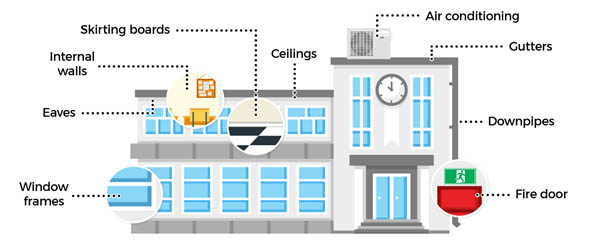Overview
Richardson Primary was built in 1984 when asbestos and lead paint were used in the building industry.
While both these materials are present in our school we know where these materials exist, or are likely to exist, we monitor the locations regularly and we have a management strategy in place to keep our school community safe. Detailed reports are kept at the front office in a Hazardous Materials Register which you are welcome to view.
The diagram below indicates where some of these materials are located:

Explanatory Notes
- Gutters – may be painted with lead paint
- Downpipes – may be painted with lead paint
- Window frames – some internal and external frames may be painted with lead
- Internal walls – may be painted with lead paint
- Skirting boards – may be painted with lead paint
- Doors – door and its frame may be painted with lead paint
- Fire door – core of asbestos and may be painted with lead paint
- Heating, cooling and ventilation system – lead dust in ducts. Testing shows classrooms serviced by these ducts are safe due to daily cleaning
At Our School
| Lead | Asbestos | Other materials |
|---|---|---|
When our school was built Australian law allowed paint to contain up to 1% lead. That means that many surfaces in the school have been painted with lead paint. Lead paint at our school has been assessed, sampled and tested as shown in the Lead Paint Assessment in our Hazardous Materials Register which is available for viewing at the front office. | Asbestos was still commonly used when our school was built because it is fire resistant, provides good insulation and is durable. Examples of asbestos containing materials at our school include the core of fire doors and putty around air conditioning joints. Information about these materials can be found in the Asbestos Survey and Management Plan located in the Hazardous Materials Register. | We have synthetic mineral fibre (SMF) yellow batts in the ceiling for insulation, Some air conditioning units have a refrigerant called R22 which is an ozone depleting substance (ODS). Licensed assessors say with proper management of those units, there is a relatively low risk of ODSs leaking into the environment. There are no known PCBs in the school. |
Hazardous Materials Management In Act Public Schools
The Education Directorate is committed to transparency about how it manages hazardous materials. In mid-May 2021 the Directorate held four drop-in sessions around Canberra to discuss this issue and answer any questions about lead, asbestos and other hazardous materials in our schools.
Here’s Deputy Director General David Matthews with the presentation delivered at those sessions. You can also download a PDF of the slides here: Hazmat Drop In Sessions.pdf (882.kb)
Hear From The Experts
As part of the Education Directorate’s commitment to follow best practice hazardous materials management, it has assembled an Expert Panel to provide advice based on the latest evidence.
Macquarie University’s Professor Mark Taylor is a Panel member and one of Australia’s foremost lead experts.
Upcoming Works
Details of scheduled work to remediate or remove hazardous materials from our school will be posted below.
| Description | |
|---|---|
| Start Date | |
| End Date | |
| School Areas Restricted | |
| Contact |
External Hirers
The community is encouraged to hire our facilities. Here is a fact sheet for those renting our spaces about how hazardous materials are managed in our school.
External_Hirers_Fact_Sheet.pdf ( 149kb)
For more information
Visit the Education Directorate’s hazardous materials website
